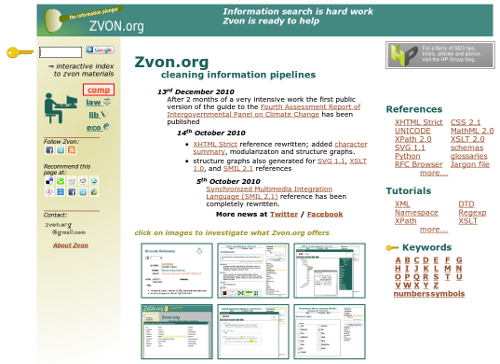
Guest post by Miloslav Nic
This is a post about my website Zvon.org where I've created a resource for the IPCC 4th Assessment Report (AR4). I've created a searchable database of almost every peer-reviewed paper referenced in the AR4, with links to each paper's abstract and lists of all the authors. This provides a powerful tool that lets you search the AR4 by author, subject, title and journal.
I used to be an organic chemist in the last millennium who reached a tipping point in 2000 and was irreversibly transformed to a computer specialist. The primary forcing behind my change was the foundation of site Zvon.org which became quite well known among XML programmers.

I always wished to turn Zvon.org from a programming site to a real information plunger (zvon means a bell but also a plunger in Czech, my native language). Zvon's international law documents represent one incarnation of this dream. I have a first hand experience with an authoritative regime and so I do care about freedom and civil liberties.
Fourth Assessment Report of Intergovernmental Panel on Climate Change (IPCC AR4) provided a real challenge to prove that Zvon.org can fulfil such vision. I hope the following paragraphs about Zvon.org Guide to IPCC AR4 will whet your appetite to try it and judge for yourselves.

The first feature of the guide is rather trivial but I found it surprisingly useful. The contents page lists all chapters of the report using a keyword characterizing the chapter. A click on working group name then leads to the chapter contents and click on a chapter keyword leads to the enhanced references' list.

When I am searching for some information about particular topic (e.g. sensitivity) I write a few characters to the search box which are then found in titles of all chapters and sub-chapters. I can then jump directly to the relevant part of the IPCC report using ?ipcc link or click on a chapter title to investigate relevant references.
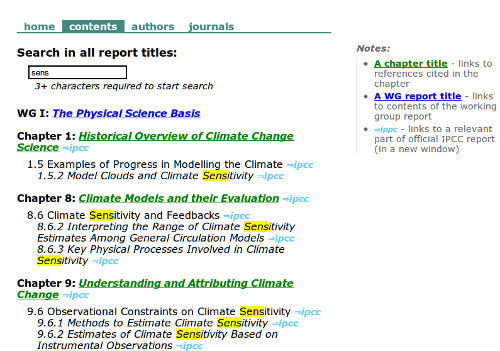
IPCC chapters' references are the focus of the guide. References are displayed as they appear in the IPCC report but they are enhanced with links to the original article (via doi), information about the journal, and direct links to records in the most used general databases of scientific literature - Web of Science and Scopus.
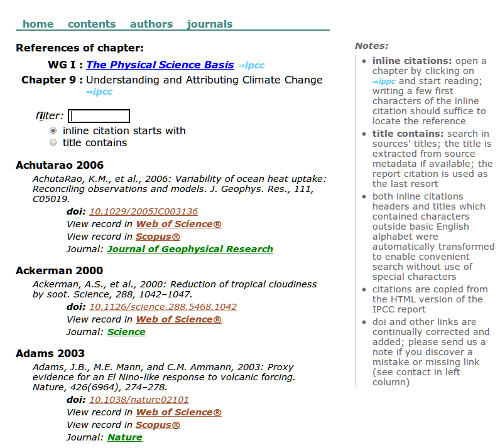
Facts and conclusions in the report must be obviously very concise and they are usually not sufficient to get a deeper feeling for the problem. Abstracts of articles (and sometimes full texts as well) are nowadays available free of charge, but finding the original source of each reference while reading the report is time intensive. The Zvon guide shortens the required time so significantly that I can readily consult dozens of references in few minutes.
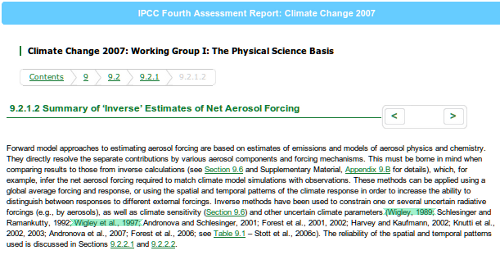
References in Zvon guide may be filtered by name of the first author. Citations in the text of IPCC report are referred to by the name of the first author and year of publication and so the filter provides convenient shortcut to the reference.
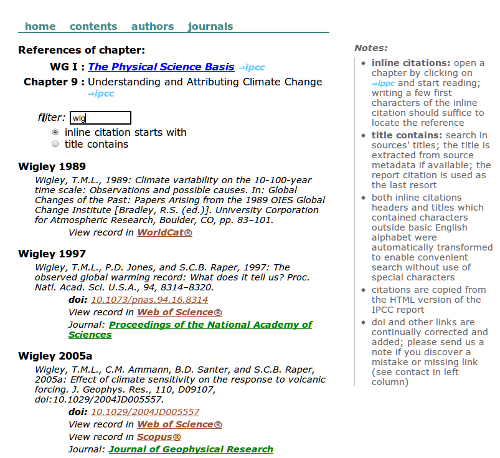
The references can be also browsed by title words. Most chapters contain many hundreds references and as each chapter is devoted to a particular problem this feature represents a useful view to the relevant literature.
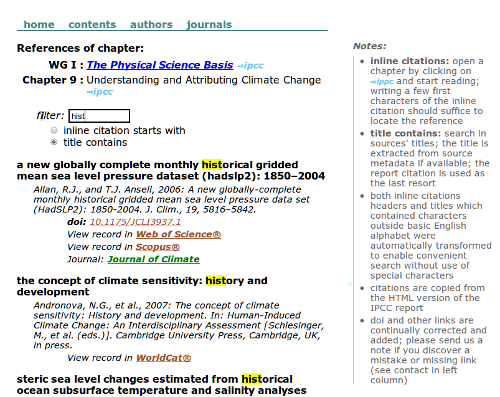
Zvon guide uses meta-data downloaded from publishers and so even authors not explicitly mentioned in the report are included. This fact is used in authors' browser. Some results can be quite interesting especially if you consult citation counts in Web of Science or Scopus.
This fact may be demonstrated by comparison of searches for Hansen, Lindzen and McIntyre. While the list cannot distinguish between causes - is it because of scientific achievements in climate research or dirty conspiracy? ;) - at least it provides quite a definitive answer about mainstream influence.
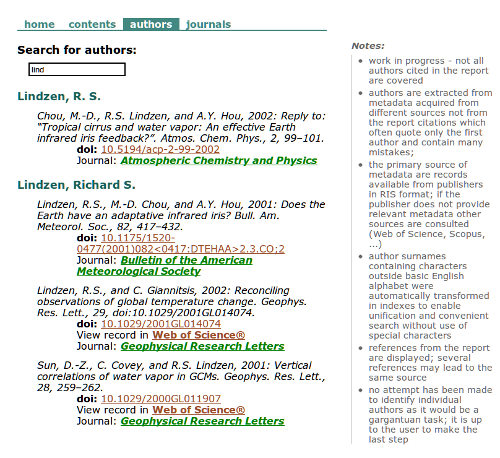
The last feature mentioned in this post is comparison of the referred journals. It helps with an answer to the question: what are the most influential journals in mainstream climate change research? Numbers both for the whole report and for individual working groups are provided.

I started to work on this material with my former MSc. student Radka Hrotkova couple of years ago. Collecting all the materials is rather tiresome work which drags on forever. If you find the Zvon IPCC guide useful please share the information with other people - we need to recharge our batteries sometimes and nothing helps more than reasonable usage statistics :).
If you would like to keep in touch with Zvon IPCC guide development and with other climate and ecology related Zvon's announcements you may subscribe to our tweets, the next climate material should appear early in January.
Posted by Mila on Monday, 20 December, 2010
 |
The Skeptical Science website by Skeptical Science is licensed under a Creative Commons Attribution 3.0 Unported License. |